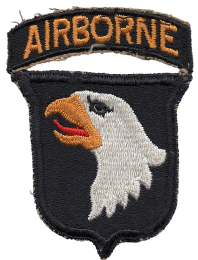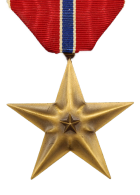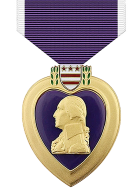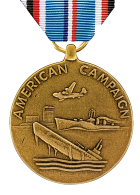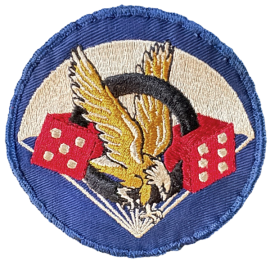I was born on 10/14/1925 in Orange, Texas. I entered the Army in 1942 after moving to Pennsylvania in 1939. I went to Indiantown Gap, Pennsylvania for introduction, then sent to Camp Blanding, Florida for basic training in 1943. I was assigned to the Second Battalion of the 506th Parachute Infantry Regiment in May 1944. On June 6th, I jumped in Normandy, France. I landed in a tree about 2 miles from St. Maire-Eglise, I was so heavily loaded with equipment, that my friend Jim Campbell had to cut me down. We were a long way from our original DZ and we came under the responsability of the 82nd Airborne Division. We were attached to B Company, 508th Parachute Infantry Regiment, 82nd Airborne Division for a few days fighting around St. Marie-Eglise. After 3 days we finally found our way back to Carentan.
Market Garden
After Normandy, back in Alderbourne, England, I was assigned to E Company 506th Parachute Infantry Regiment this was in August 1944. There getting ready to jump in Holland. Landed at Son DZ. On September 18-19 we liberated Eindhoven, after which we waited for the British troops. A young dutch boy about 14 years old came up to Mike Massoconni and myself and showed us the houses where the Germans were held up. We then began to clear the houses and captured about 6 Germans while doing so. The boy only had a small caliber pistol. I gave him my trench knife with my name on it, which to this day is on exibition at the museum in Eindhoven.
Mike and I put a 30 caliber machine gun on top of a building in Eindhoven for a better field of fire. We had a killing zone of three intersections and we could suppress any movement very weIl. But during the fighting, a German mortar came down through the skylight of the building and we heard bottles breaking. Peeking through the skylight I saw we were sitting on top of the Heineken beer brewery. Needless to say, we also liberated a few bottles.
On september 22, our company moved to Uden. After the Germans cut behind us and we were surrounded in Uden. We broke through and went to Veghel, where we encountered extremely heavy fighting. Two days later my squad dug in in an apple orchard in the town of Veghel, which was a huge mistake. German artillery was fierce and murderous, the rounds would hit the trees, burst and the shrapnel would come down on us, so much for the foxholes which were of no use to us at this point. On september 25th we were attached to British tanks and cleared Veghel with the loss of only 1 tank and alas a few fellow soldiers.
A day later...herendous fighting up and down Hell's Highway, while protecting the British tanks who like ourselves were trying to get to Arnhem. Donald Hooper and myself managed to knock out a German half track. We moved to Opheusden on october 3rd, where near the Neder Rhine we fought with Germans who were trying to push us back. From october 9th to october 21st, our job consisted of holding defensive positions on the dike. Extensive patrols and counter strikes on Germans positions were a day job.
At that time Leibgott and myself captured 8 Germans. A German sniper located in a factory about a thousand yards away, was constantly keeping us pinned down until Pace aimed and took him out, a good shot. During a German counterattack, I was blown off the dike by the impact of a German mortar and got it in the right leg. Wounded, I was evacuated. I joined up with my company again in mid November in a town called Mourmelon in France. That was where we got the orders to move to Bastogne, Belgium.
Bastogne and the Battle of the Bulge
The date is december 17th. We got onto army trucks and left for Bastogne. Easy company, upon arriving, set up strong defense lines at Foy and Bastogne. The line was held as a large German attack was stopped when they tried to overrun us. In the days that followed many patrol/ambush-recons took place. During the second half of december many enemy contacts and crossfires occured on both sides.
E Company attacks and clears the woods of Bois Jacques on the 2d of January, which was located north of our position. In the bloody attack of approximately one thousand yards. Rader was wounded, Sawesko was killed, Smith was wounded, Sholty was wounded, Webb was killed. After the attack, we returned to the line where we were heavily and continously shelled by Germans artillery. Easy again suffered many casualties. I was wounded for the second time since the beginning of the war, but because I could not be evacuated I stayed right where I was and a medic took care of me.
Easy along with the 2nd battalion attacks Recogne on January 9th. Because of the massive shelling a lot more casualties and loss of life was the toll to get control of the high ground near Recogne. Then finally, Easy was pulled back into reserve for 2 days from January 9th to January 11th. After a two day rest Easy was ordered to attack and clear out the town of Foy. In the battle for Foy several men were wounded and killed and Lt. Spears became our C.O. This all occured on January the 13th. The next day Easy was ordered to move to Noville and to attack and clear the town. Again two days later on January the 6th Easy attacks and clears Rachamps. Then Easy is pulled of the line again after one of it's most horrific times at the front we prepared to be relieved by the 17th Airborne and we moved toward Germany and Hagenau. A few days later Easy takes over positions in Haguenau where there is not much to do but the daily patrols. On one of these patrols, Wynn nearly drowned himself trying to cross the river on patrol.
February 25th Easy is ordered to move back to Mourmelon, France for refitting. While we were there, on March 15th, the entire 101 st Airborne Division receives the Presidential Unit Citation, the first citation ever to an entire Division. On April 1st Easy leaves for the Rhine River opposite Dusseldorf to restrain the German forces in the Ruhrpocket. April 20th Easy eceives the last combat command order of the war, to take Berchtesgaden.
We came across our first concentration camp at Memmingen in Bavaria on April 28th. That is were I saw some of the worst sights a man can ever see. On May 5th Easy Company finally enters Berchtesgaden, three days later the war was over. The 506th was relocated to new headquarters at Zell am See, Austria. The division was de-activated in November, 1945.
I continued my service in the 101st and also fought in Korea
Clancy Lyall

